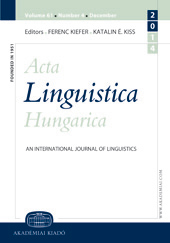A typology of non-verbal predication in Erzya
A typology of non-verbal predication in Erzya
Author(s): Rigina TurunenSubject(s): Theoretical Linguistics, Finno-Ugrian studies
Published by: Akadémiai Kiadó
Keywords: typology; predication strategy; nominal predicate; adjectival predicate; locational predicate;
Summary/Abstract: In the domain of non-verbal predication, three predication strategies are identified in Erzya. Predication is expressed in nominal, adjectival and locational predicate constructions by (i) the zero-copula construction, (ii) the predicative suffix construction or (iii) the copula construction. The variation of predication patterns is constrained by at least two factors. The part-of-speech affiliation of the predicate affects the choice of predication strategy. The relative frequency and degree of obligation for using the predicative suffix construction decreases as we move along the scale verb-adjective-noun. Thus, nominal predicates are encoded more often by zero-copula constructions than adjectival and locational predicates are. Another important factor that affects the choice of predication strategy is genre. To encode the present tense, predicative suffix constructions are more frequent in written Standard Erzya, while the zero-copula construction is more typical of spontaneous speech and translations. In written Standard Erzya, the predicative suffix construction occurs more regularly than the copula construction for encoding the past tense, too, whereas in the data coming from folklore, spontaneous speech and translations, the copula construction is clearly preferred.
Journal: Acta Linguistica Hungarica (Since 2017 Acta Linguistica Academica)
- Issue Year: 56/2009
- Issue No: 2-3
- Page Range: 251-313
- Page Count: 63
- Language: English

